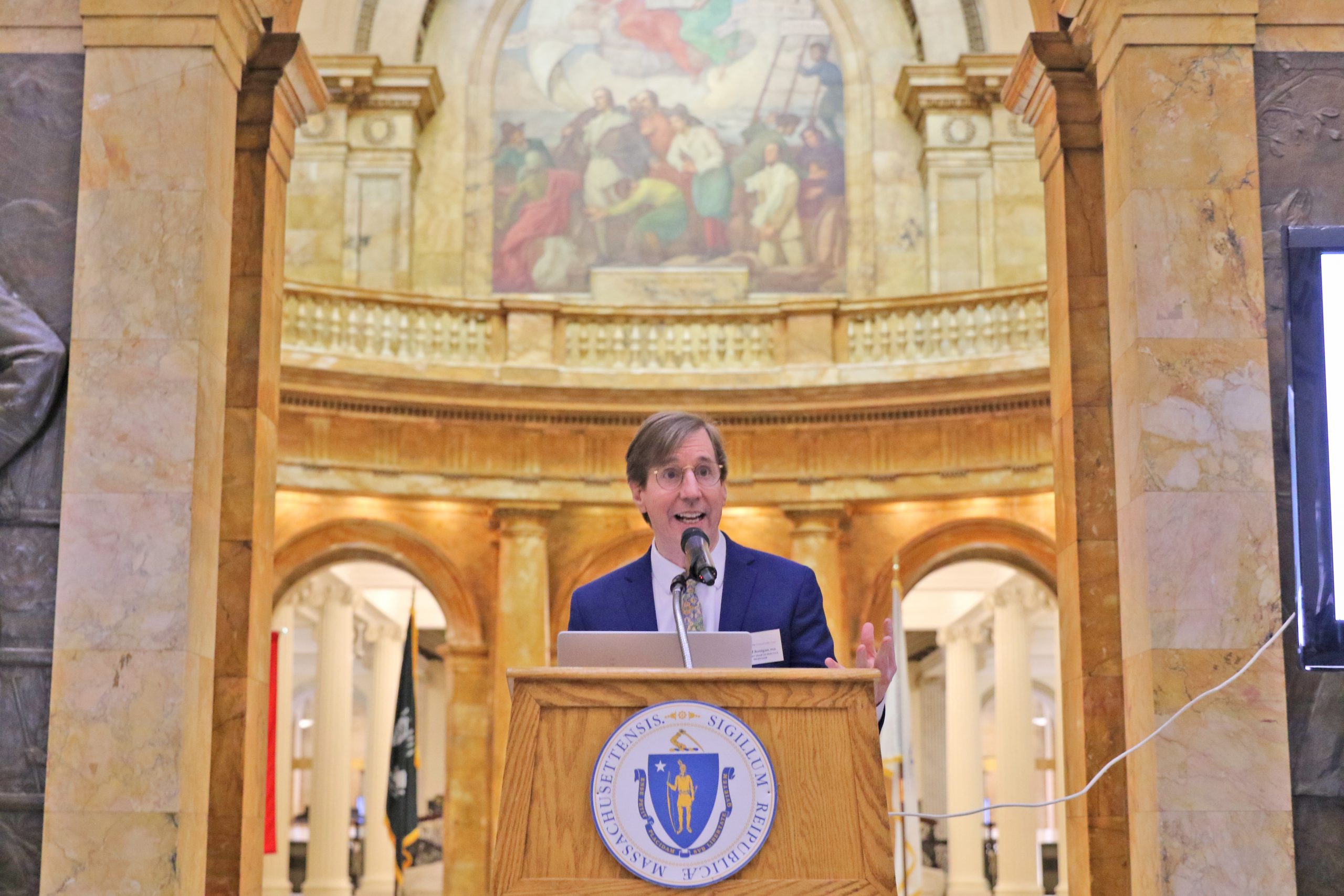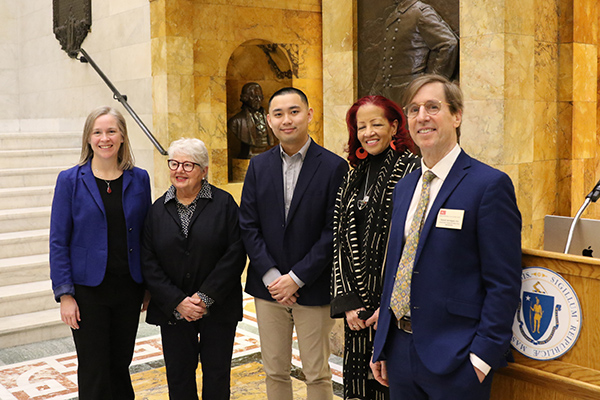‘Alcohol Taxes Save Lives’.

‘Alcohol Taxes Save Lives’
During a briefing at the Massachusetts State House, David Jernigan presented state legislators with a series of recommendations to cut alcohol consumption.
With alcohol accounting for 1 in 20 deaths in Massachusetts and linked to a steady toll of adverse health outcomes, School of Public Health researchers recommend the state adopt policies to limit alcohol availability, reduce the amount of alcohol advertising, and increase alcohol prices through raised taxes.
These were among the key proposals of a legislative briefing at the Massachusetts State House that featured research coauthored by David Jernigan, a professor of health law, policy, and management; and BUSPH graduate student Xixi Zhou. The report was funded by a grant from the BUSPH idea hub.
“Here in the Commonwealth, over 3,000 deaths were attributable to alcohol in 2019, with 110,000 years of life lost. This is a big difference between alcohol and tobacco,” Jernigan told an audience of state legislators, policy advocates, and lobbyists. “Alcohol tends to kill and disable at a much younger age than tobacco, and the share of years of life lost to death and disability from alcohol has been rising in the last decade, up 14 percent. Alcohol’s share of total death and disability in the Commonwealth is rising faster than lung cancer, diabetes, high blood pressure, dietary risks, or tobacco.”
Sen. Jason Lewis (D-5th Middlesex), and Rep. Kay Khan (D-11th Middlesex) urged their colleagues to support House Docket 3101, a bill Khan sponsored in the current legislative session that would double the state’s excise taxes on alcohol. The measure also specifies that revenue from raised excise taxes will be used to fund substance abuse treatment and health education programs. In the State Senate, Lewis has sponsored Senate Docket 931, which would also increase excise taxes on various types of alcoholic beverages and allocate funds for domestic violence prevention, substance abuse treatment, and state worker pensions.
“These are the stories of what’s happening in Massachusetts. These are the stories of what’s happening across the country,” said Rep. Marjorie Decker (D-25th Middlesex), who hosted the event. “This report is about taking those stories and pulling them together in a way that makes it very accessible and very clear.”
The report’s findings are a direct challenge to advocates, health care providers, and legislators, Decker said. “The ball’s in your court. How will you take this really good information and be accountable to create change to save lives?”

The report’s authors cite a 2017 World Health Organization finding that the most effective—and cost-effective—ways to reduce alcohol problems are “limiting the physical availability of alcohol, restricting and reducing alcohol advertising and marketing, and increasing the price of alcohol, usually by raising alcohol taxes.”
Long past any dated Puritanical stereotypes, the Commonwealth of Massachusetts is actually “swimming in places to get alcohol,” Jernigan said. “The number of active alcohol licenses in this state went up by 63 percent in the last decade.”
Local licensing authorities issue retail alcohol consumption licenses based on population guidelines and quotas set by the state, allocating permits between places that allow on-premises consumption, such as restaurants, hotels, and bars; and places that sell alcohol for off-premises consumption, such as grocery stores, liquor stores, and convenience stores.
“We have nearly three times as many places to buy alcohol for takeaway than we have Dunkin’ Donut stores,” Jernigan said.
Of the 16 states that set quotas on the number of off-premises licenses per population, only three—Montana, South Dakota, and Washington state—had more generous quotas than Massachusetts. For on-premises licenses, Massachusetts is still relatively permissive, with about five active licenses per 3,000 population. For comparison, New Jersey and Pennsylvania limit licenses in their state to one per 3,000 population.
“Bringing the excise tax up will give us money to put into a special fund that will go particularly for treatment and education,” Khan said. “We really feel that’s something very important that we need to do.”
Jernigan condensed that view into a single statement: “Alcohol taxes save lives.”
In Massachusetts, excise taxes on alcohol are directly charged to importers and wholesalers, but are usually passed along to retailers and consumers. Massachusetts does not include alcoholic beverages among products subject to a state sales tax. In 2010, opponents of alcohol sales taxes used fears of higher prices to force a ballot initiative that repealed a short-lived sales tax on alcohol that passed in 2009.
“Were Massachusetts to increase its alcohol tax, approximately a third of Massachusetts residents age 18 and above would pay no additional tax, because they did not drink in the past year,” the report states. According to the Centers for Disease Control and Prevention, about 8 percent of adults who drink account for half of the 35 billion total drinks consumed by US adults each year. “Because alcohol consumption is skewed toward the heaviest drinkers, the bulk of the tax—an estimated 73.5 percent—would be paid by excessive drinkers…”, Jernigan and Zhou wrote.
Worth noting, Jernigan said, is the difference between what alcohol costs the state compared to the revenues raised. Using 2010 data, the last year for which estimates are available, alcohol problems cost the state $861 per person. “Of that, $345 was paid out directly by government. And in return, in 2020, government was taking in about $11 per person from alcohol taxes. So we have a big problem. The revenues come nowhere near covering the cost of alcohol.”
Also delivering remarks during the briefing were Leah Randolph, DEI chair of the Massachusetts Organization for Addiction Recovery (MORE), and executive director of Commonwealth Mental Health and Wellness Center; Anthony Chui, director of Health and Human Services for Melrose, Wakefield, and Stoneham; Elizabeth Parsons, director of the Massachusetts Alcohol Policy Coalition; and Dr. Sharon Levy, director of the Adolescent Substance Abuse Program at Boston Children’s Hospital, who spoke via video message.
State Sen. Lewis agreed with his colleagues and told the audience that raising alcohol taxes is among the strategies to reduce consumption that legislators should consider. “They haven’t been updated since the early 1980’s. Just the impact of inflation means that the excise taxes we have on wine, beer and spirits have reduced significantly in value,” Lewis said.
Using data from 2021, Jernigan and Zhou wrote that alcohol excise taxes in Massachusetts have lost 72 percent of their value since 1980, and current taxes on beer are 44th in the nation and the lowest in New England. The wine excise tax was 33rd in the nation and lower than all New England states except for Vermont, while the distilled spirits rate was 36th in the nation and the lowest in New England except for New Hampshire.
Increasing taxes could be an important tool to reduce consumption, Lewis said, because “if we can raise those prices, that will also deter young people, particularly from binge drinking. And with the additional revenues that the state will bring in, we can be using those revenues as well for further public health investment, including for addressing substance use disorder and addiction.”
Jernigan said taxes were just one of the potential steps that could be employed to reduce alcohol consumption, reiterating the importance of reducing both alcohol availability and marketing.
“We have no shortage of places to buy or consume alcohol and many more than comparable states. We do little as a state to reduce the likelihood of youth exposure influenced by alcohol marketing,” Jernigan said. “There’s much more than our state could do to save lives, protect young people, and make Massachusetts safer and healthier for all. I like to think we have a lot of potential here.”